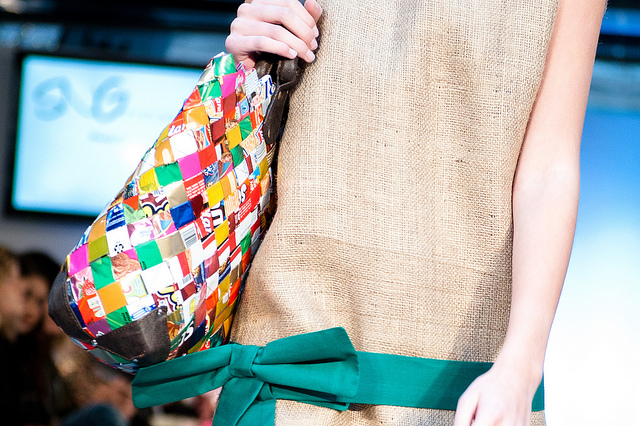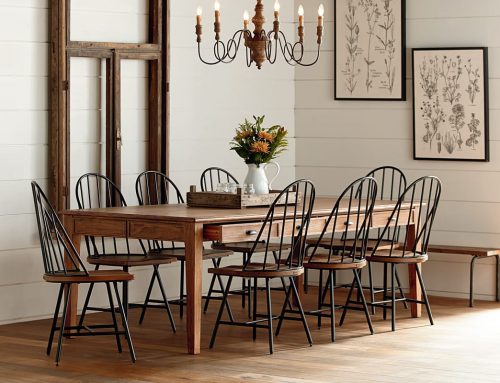This month at Postconsumers, we’re shining the light on some activities, hobbies, niches or even social norms that are ridden with consumerism but are often thought of as being postconsumer alternatives. Today, we’re tackling something that we’ve found to be a controversial topic in the past: eco-fashion. Whether or not eco-fashion is really eco-friendly is not a new topic at Postconsumers.com. In fact, it inspired some heated debate when last we talked about it. But whether or not you believe eco-fashion to be a truly earth-friendly alternative, it’s still an area that plays to the very core of consumerism.
Eco-Fashion is Responsible About Materials and Manufacturing, Not Consumption
What separates eco-fashion from, well, just fashion is its emphasis on sustainable materials, toxin-free production and, in most cases, ethical treatment of workers. All of that is incredibly important and when you do want or need to buy clothing we certainly encourage you to make the more environmentally friendly choice. But eco-fashion is still, at its core, fashion. And fashion is based on an idea that you are defined by your “stuff” (in this case what you wear), that more is never enough and that seasonal trends are more important than reducing the amount of “stuff” that you own. Let’s take a look at each of these three elements.
You Are What You Wear
Of course, you aren’t really what you wear. But what you do wear does typically reflect a great deal about your personality. There is, however, a significant difference between selecting clothes that reflect who you are (perhaps you’re a brightly colored person instead of an all-black, every day person) and buying clothes that you don’t need just because something about them defines you. This is our way of saying that there is no difference between the person who buys the thousand dollar designer handbag in order to keep up with the joneses and the person who buys the fifty dollar eco-friendly handbag just to be a part of the cool, green crowd. Buying something to strengthen your appearance as one type of person or another is the essence of a consumer infiltrated society. It’s the same as choosing to shop at Whole Foods when the exact same products are also sold in your local mom and pop shop. There’s nothing wrong with buying eco-fashion when the need or even the desire arises. There is a problem with buying eco-fashion just to fortify your own or others’ perception of who you are. Who you are is much, much more than what’s on your body. As we like to say at Postconsumers, “Be your own brand.”
More is Never Enough … Shoes, Clothing or Accessories
The Imelda Marcos or Carrie Bradshaw joke about never having enough shoes is overplayed, but there’s still more than a kernel of truth in it. The heart of fashion marketing is a sense of needing to collect or curate items. After all, realistically, how many pairs of shoes or cardigan sweaters or earrings does any one person actually need to have? The answer is, obviously, far fewer than the fashion industry would have you believe, because the fashion industry needs you to buy multiples of almost every item in your closet in order to turn high profits. If you only bought one pair of shoes per year, think of the impact on the society! The idea that you need more, more and more is one of the central cores of consumerism. Without it, addictive consumerism couldn’t really exist, so any fashion sector promotes this theory. That includes eco-fashion.
Be On-Trend. Even If That Trend is Wasteful.
However, the most powerful element of consumerism that’s fully embraced by the eco-fashion industry is that of trends. Trends are how fashion companies and houses convince you to buy more and that you need to keep up with the Joneses. If there were not trends, then the clothing that you bought a year ago would still be perfectly fine to wear. But because there are trends, people need to make sure that they go out and buy, you guessed it, more new “stuff.” There’s nothing eco-friendly at all about buying more “stuff” just for the sake of having more or having something that is on-trend. The nature of consumerism, which is required for the current fashion industry to operate, and the nature of environmentalism are entirely at odds here.
Eco-fashion is always a better choice than non-eco-fashion, but be smart about how much of what you’re purchasing is being done for consumerist reasons rather than ethical ones.
Did we miss a way that eco-fashion and consumerism are entwined that you want to share with us? If so, just tell us about it on one of the social media channels below.
Facebook | Twitter | Instagram | Tumblr | Pinterest | Google+
Photo Credit: Jason Hargrove via Flickr




